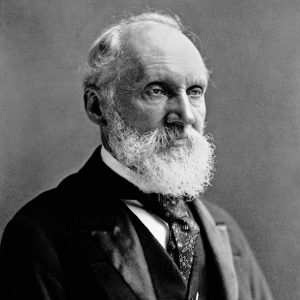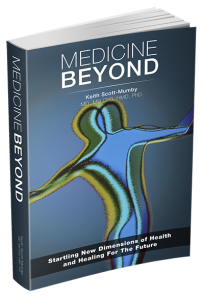We have no right to assume that any physical laws exist, or if they have existed up to now, that they will continue to exist in a similar manner in the future.
– Max Planck, founder of quantum physics (1858-1947)
It might seem strange for a medical doctor to bounce around arguments from the field of cosmology. But this is only a superficial confusion. If you think about it for even just a moment, we MUST understand how our world works, if we are ever to understand the science and mechanisms of effective healing.
If physics has the wrong model, then medical science is inevitably skewed too. As a result we will find ourselves failing to aid patients in the way we should. And it seems to me that this is what has been happening more and more, in the last half century or so.
Boldly stated: doctors who don’t know and understand advanced physics don’t know any worthwhile medicine! It’s akin to the over-specialization problem. There’s a joke among doctors, which says that a specialist or “expert” is a person who knows more and more about less and less! In the end we have a dermatologist who can’t recognize the symptoms of food allergy; a psychiatrist who doesn’t recognize the signs of gross vitamin deficiency; a cardiologist who wouldn’t know a healthy diet from a dangerous one; an internist who never asks his patients about stress in their lives.
Each expert is so focused on what he or she knows best, other relevant aspects of health are simply ignored, as if they were unimportant. Thus a patient starts to become a foot, a liver, just skin, a pair of lungs or a brain.
We know that’s wrong, of course. It’s farcical to say it. But why would it be any different a doctor not knowing how the cosmos came about? Is it important? Yes. And this book attempts to seek out a new paradigm or reality, in order to better practice medicine and the healing arts.
We’ll also have a crack at putting science back on its feet. Science—real science—is now virtually hostage to Big Business interests. Instead of the truth, science is used to generate profits. This is far from how it was in centuries gone by, when scientists had little or no money motivation. Science then was explored by rich men and women, some of them Lords and Ladies, whose interest was the pursuit of the truth, not to knock out any commercial competition.
Real science is simply a method, an approach to finding how things work, and the best we can hope for is to close in gradually on the truth. But there is never an end to the process. Science today is increasingly dogged by the absurd belief that science has the answers, which are now “correct” and will never need to be changed. That can never be true.
In 1999, I opened my book Virtual Medicine (now updated as Medicine Beyond) with these words…
Our view of the world is changing fast. A quarter of a century ago there were things that scientists were absolutely certain were true which, today, we are absolutely certain are not true! Nowhere is this more evident than in the physics of organisms. In just a few decades we have moved from the position where the human energetic aura was deemed not to exist, to the point where there is ample scientific proof of its existence and several good theories as to its nature and function.
Studies have been carried out in many major universities of the world which, although they are largely ignored by those who have some other “truth” to peddle, have nevertheless done a great deal to unite realms that were once held to be only metaphysical (hence the name) with the accepted tenets of everyday science.
I pointed out that the reality of this “science”, as its own proponents define it, is a shifting quicksand of fashions and opinions, which regularly contradicts itself—often embarrassingly so. And when there is clear evidence that the paradigm is heading in the wrong direction, it is always ignored. Nothing must disturb the status quo! No siree!
For example, two of the grandest and most revolutionary theories of the last century, Einstein’s relativity and Planck’s quantum mechanics, are in such disharmony that they appear mutually exclusive. All speculative talk of the grand unifying theory, which brings all the contradictions together, is just talk, nothing more. Yet we are promised that it is “just around the corner”; we are almost complete on physics!
Well, we’ve heard that before. In the 19th century, William Thomson, later Lord Kelvin, the most famous and influential scientist of the day (he gave us, among other things, the Kelvin scale of temperature: absolute zero is Kelvin zero), said that the future of physics lay “in the last decimal place.” He also reputedly said, in 1900, in an address to an assemblage of physicists at the British Association for the Advancement of Science: “There is nothing new to be discovered in physics now. All that remains is more and more precise measurement.”

Lord Kelvin. A handsome dog, in his quintessentially Victorian way!
Whether he really said that or not, within less than two decades of those complacent words, the discovery of radioactivity, the theory of relativity, and the development of quantum mechanics left his comfortable drawing-room science shattered in ruins. Almost overnight, waves were particles, then they were both, and now they are neither; matter is energy and vice versa; particles come and go in an infinite void; atoms, which were fixed and unchanging, suddenly turned out to be gradually decaying (radio-activity).
Everything Kelvin knew and believed in was turned upside down. One cannot help but believe that in modern times the only certain thing to have come out of science is Heisenberg’s Uncertainty Principle.
In the 21st century, the zeal and self-delusion have only got worse. Scientific dogma is now running at the level of fanaticism and bigotry that characterizes the narrow-minded intolerance of the world’s major religions. The term “scientism” has been coined to mean a level of pretense and rigidity that excludes all possible merits of true scientific undertaking. It is itself a kind of proto-religion, with people like the late Stephen Hawking as its prophets and Richard Dawkins as its ranting high priest.
I’d rather follow Richard P. Feynman, the famous US physicist and Nobel Leaureate, who famously remarked: I would rather have questions that can’t be answered than answers that can’t be questioned. I like that, because it’s honest.
Today, of course, we have the criminality of fake science, fake figures, fudged results, unworkable solutions and FORCE being used, instead facts, proof and reason, to introduce the world to ideas. It’s just not science. If there is one essential element to science , it is HONESTY.
If you have never read my book Medicine Beyond, maybe it’s time to get a copy. It’s all about the extreme edges of science and what that means to us.
It’s actually rather exciting and… I’m told… at least as thrilling as a novel! Well, it is “novel”, as in amazingly new.
I long for you to survive COVID unscathed.
To your good health,

Prof. Keith Scott-Mumby
The Official Alternative Doctor

